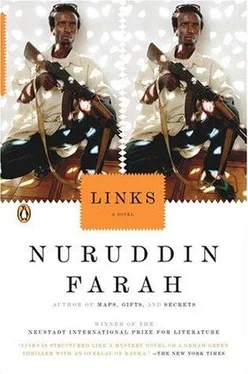Qasiir strode as though on a movie set, cameras rolling to catch every one of his antics. The combination of boots and Stetson made him appear taller; he put on a tough expression, thumbs stuck deep into his ammunition belt, teeth biting down on a chewing-stick the size of a cigarillo. Jeebleh imagined a harmonica being played nearby, and Clint Eastwood making a cameo appearance. For all his posturing, he struck Jeebleh as a youth who had come through muck, in which he wallowed; death, which he courted without fear; and humiliation, which he fought hard to subdue in his own way.
His voice firm, on edge, and low, Dajaal told Qasiir that he was fed up to the back teeth with his tomfoolery. “Send your sidekicks away, and follow us to your mother’s house, pronto!”
But first Dajaal made a detour to the spot where the helicopter had fallen that October afternoon in 1993. The place looked like any other in a dusty city where furious wars raged. Here, however, there were pieces of metal, once part of a war machine — elegant, noisily powerful, and threatening when up in the air, but unimaginably ugly when fallen and dismantled. A group of rowdy children kicking up a storm of dust abruptly suspended their ball game at Dajaal’s bidding, and they gathered close to him and Jeebleh. The children were curious about Jeebleh; they understood he was a visitor to the city. They guessed that he, like a number of other strangers before him, was calling on the disturbed girl and her mother who lived nearby, casualties of a battle that didn’t concern them.
Qasiir joined them now, and for Jeebleh’s benefit pointed out the battle lines: to the right, where the fighters supporting StrongmanSouth had been, and to the left, where the Americans had been. In a wall improvised from sheets of zinc, they could see evidence of liberal hits from all sides, by bullets of all sizes.
More children joined the group, and a handful of adults came out of their shacks. Dajaal ushered Jeebleh away from the curious onlookers, and led the way to the compound where Qasiir’s brain-damaged sister and her mother awaited them. Just as they reached the gate, a cat came out from underneath, flattening against the ground to avoid being cut by protruding nails.
It dawned on Jeebleh that he was acting out of character: there was nothing to gain from a visit to the little girl and her mother. No doubt, they had suffered as casualties of a senseless battle, and had survived huge personal ordeals. But he didn’t wish to cut the figure of the war tourist, making a voyeuristic study of a sordid aspect of a sad war that shouldn’t have taken place at all. Everything seemed more ominous as they moved into the compound, Dajaal holding back as tradition demanded, stopping outside and announcing “Hoodi!” and awaiting his daughter-in-law’s welcoming “Hodeen!” before going any further. Qasiir entered the squat building without ceremony. A moment later, music came at them from inside, James Brown screeching, hooting, and grunting to the timbre of his soul.
A HAND PUSHED THROUGH THE CURTAIN AT THE DOORWAY. THEN A WOMAN wrapped in a floral robe, an edge of it held between her teeth, emerged, her gaze deferentially downcast. With one hand clutching her right ear, the other holding a little girl’s hand, she came forward. The girl, her gaze diffuse, held the lower edge of the woman’s robe. It was clear from the little one’s movements that all was not well with her. Jeebleh was uncomfortable as he followed her inside, and he looked away from the pair to Dajaal, who by then had found two chairs for them to sit on. Jeebleh was tempted to turn his back on the whole business, and walk out of the house. But he thought better of it when Dajaal introduced the woman, calling her by name, which Jeebleh failed to catch. It wouldn’t do to unnecessarily displease Dajaal, who had been very kind to him all along, and he didn’t want to be rude to the poor woman or her unfortunate daughter. He shook the woman’s hand when she proffered it. Dajaal called to his granddaughter several times; her delayed response suggested that she was hard of hearing, or retarded, or both.
“She’s deaf from the helicopter noise,” Dajaal explained. “And yet she manages to hear ungodly noises, like airplanes, and huge diesel truck engines, and heavy-duty motorbikes, and she cries and cries and cries, nonstop. Maybe she senses the earth shaking, I don’t know.”
The girl stood staring at them, her thumb in her mouth. Jeebleh tried to entice her with the candies, but she wouldn’t approach. He tried to engage her in baby talk, but she just stared at him, as though in amazement.
“What’s your name?” he asked.
The young thing wouldn’t speak. Now he looked up at her mother bringing tea, the child almost tripping her. “My daughter hasn’t spoken a word all these years,” the woman told Jeebleh.
Dajaal tried to bring the girl over to Jeebleh, but she cried so fiercely he left her alone. After a few minutes, when his daughter-in-law had served them tea, Dajaal invited her to come and take the candies out of his own palm. He sat so close to her he could’ve touched her. The girl’s pupils appeared dilated, but her stare was unseeing.
When her grandfather’s hand went nearer to give her the candy, she burst again into tears and, taking several steps at once, fell forward. Her mother picked her up, quieted her. The girl, now somewhat relaxed, studied the strange world from the advantageous height of her mother’s protective hip.
“She lives in a world of fear,” the woman said. “Dust storms disturb her, noises too.”
“You say she doesn’t speak at all?”
“She can’t string two words together.”
“And doesn’t laugh either,” Dajaal said.
“How old is she?”
“Almost five and a half.”
Jeebleh didn’t know what to say.
“A baby does not suffer alone,” the mother said.
Dajaal stayed out of it now, seemingly aloof.
The mother continued, “We all suffer with our babies, share in their suffering, don’t we? It’s been very difficult to be the mother of a child who’s never smiled, and never known laughter or the joy of being young. She cries fitfully, wets her bed and slobbers, her nose is forever moist. We keep trying to make her blow it, but I doubt she’ll ever blow it for herself.”
Jeebleh looked from the woman to the child and finally to Dajaal, as if he wanted to be helped out of a fix he had got himself into. He rose to his feet hesitantly and stood unsteadily. Then James Brown’s honking was no more, and Dajaal was telling Qasiir to tell Jeebleh all that had happened on the day the helicopter’s uprush hurt his sister.
Before Qasiir could speak, his mother began: “Children in search of a bit of fun were the first to run to the villa where the two helicopters were hovering menacingly. There were American soldiers in the helicopters, an attack team of about twelve, in big vests worn over fatigues. The earth shook to its foundation, and we were all frightened. We had a routine to follow when helicopters came or when we expected an attack: we would all go together and move north, in small groups to avoid being seen, all of us protected by men with AK-47s. This wasn’t the first attack, and as with all the others, we didn’t think it would be the last.
“But I couldn’t leave, because my daughter wasn’t feeling well, and I stayed behind to give her the medicine prescribed for her earache. Besides, the arrival of the helicopters filled my son Qasiir with bravado, and he came into the room we all share, looking for his dirt-brown jeans and his T-shirt with some writing in English. I thought he might help me join the others, but his mobile rang, telling him where to go and what to do. He ran off in haste with several other boys, answering the call of their commander. They knew no fear, my son and his posse.”
Читать дальше












